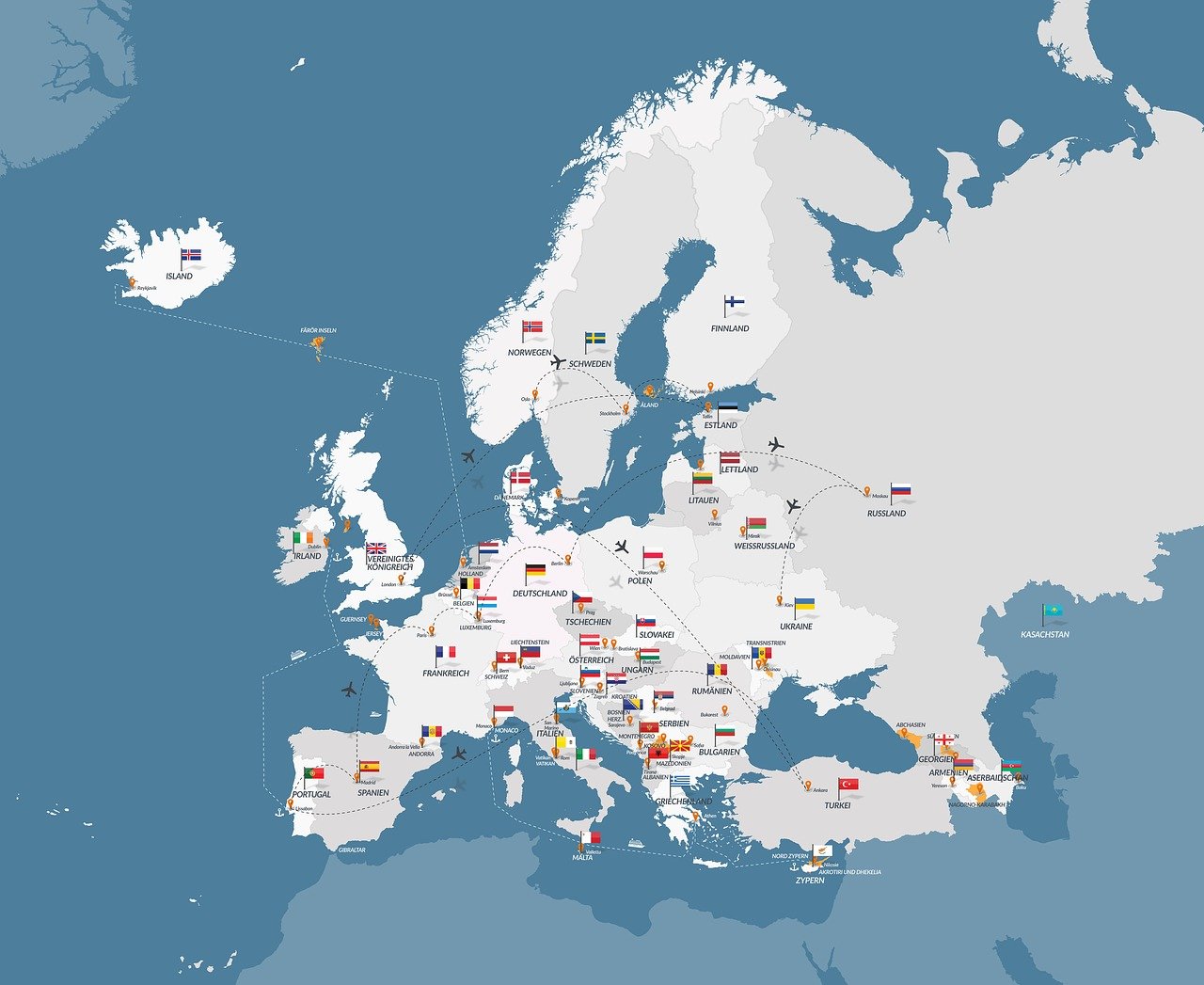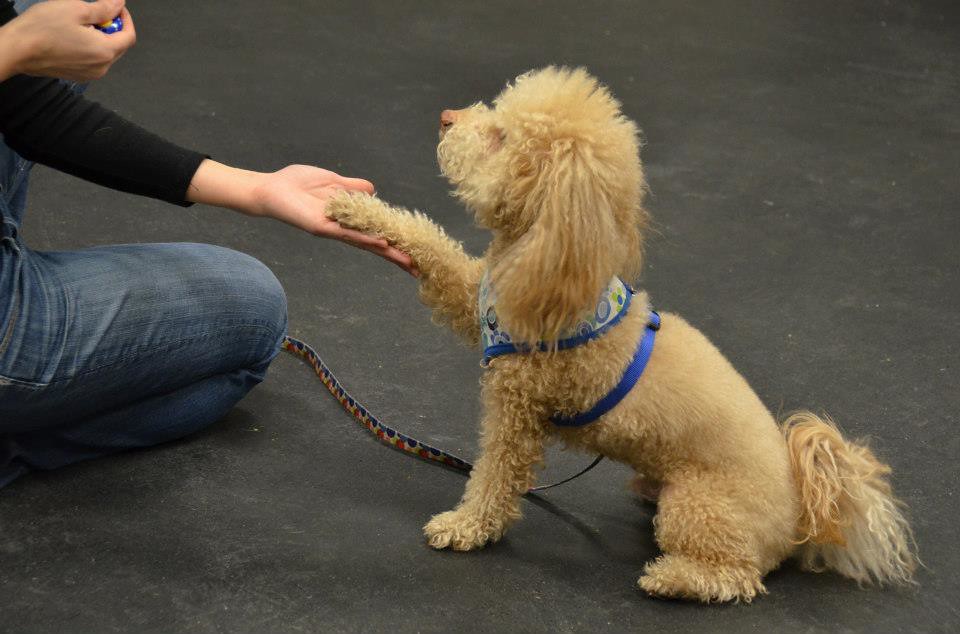
The term “assistance dogs” (also known as “service dogs”) refers to all dogs that assist individuals with physical, cognitive, or mental disabilities, performing functions that the disabled individual cannot execute independently. It is an umbrella term that includes guide dogs for the blind and visually impaired, hearing dogs, mobility dogs, assistance dogs for post-traumatic stress disorder, autism, and developmental disorders, as well as medical alert/response dogs (such as diabetes alert dogs or dogs for other metabolic diseases, epilepsy, etc.).
Disclaimer:
The information presented here may not accurately reflect recent changes in the national laws and local regulations in the countries listed below. Please use this information as a reference and a starting point for your research into the acceptance of service dogs at the destination you plan to visit. If you find any inaccuracies in the information provided on this page, we kindly ask for your assistance in correcting and updating the information here. Your feedback can tremendously help the service dog community.
The acceptance of the service dogs that have been trained and certified through our platform depends on many factors, such as:
National laws (think of banned breeds); Local certification regulations (ADI, IGDF, ADEu, and local facilities); Airline policies; Vaccination records; The dog’s health; Properly filled paperwork; Aircraft model (think of the available space)
We are unable to provide you with a list of airlines that will accept our service dog certificates for all routes that they serve. If you plan on traveling in Europe and need a certificate for completed service dog training, please consult our team via the website chat, leave a message on our contact page, or call this number: 1-800-591-1842

Republic of Ireland
The Equal Status Acts 2000-2018 [PDF file] in the Republic of Ireland prohibit discrimination in the provision of goods and services, accommodation, and education in the Republic of Ireland. Under Section 42 of the Irish Human Rights and Equality Commission Act, 2014, which is more commonly known as the “Public Sector Duty”, all public bodies shall eliminate discrimination, promote equality of opportunity, and protect the human rights and treatment of their members, staff, and the people to whom they provide services.
Owner-trained assistance dogs (also called service dogs) and their users are granted public access rights as long as:
1) They have been fully trained and do not cause disruption or pose a danger to other citizens, medical care facilities, businesses, or government institutions.
2) They are registered with a local organization or a comparable international authority that ensures the dog meets the standards required for legal recognition and public access.
The Irish Courts say [PDF file] that the following organizations are approved:
Irish Guide Dogs for the Blind; Dogs for the Disabled; Autism Assistance Dogs Ireland; International Guide Dog Federation; Canine Partners UK; Dog A.I.D. UK; Guide Dogs UK; Hearing Dogs for Deaf People UK; Medical Detection Dogs UK; Support Dogs UK
Owner-trained dogs do not attain formal service-dog recognition automatically. The training courses and certification from our online platform can be the first step to affordable training for your dog. After completing one of our service dog courses, you may wish to follow up with a formal evaluation with a local Irish facility.
If you will be visiting Ireland with a self-trained service dog from another country, you will not have guaranteed public access rights with your dog unless your training is verified independently. Also, we encourage you to have a medical letter from your doctor that attests you require a service dog for your well-being, in case the local law enforcement officers require additional paperwork to affirm that you have a legitimate medical need for a service dog. It is best to make sure the dog is accustomed to wearing a service dog vest. The vest, paired with your paperwork, should help you protect your rights and seek reasonable accommodation.

United Kingdom
The United Kingdom has two laws titled: The Equality Act 2010 and The Disability Discrimination Act 1995. Both laws prohibit discrimination against disabled citizens with assistance dogs. The regulations are enforced by the Equality and Human Rights Commission (EHRC). The commission has also published extended guidance on assistance dogs, where it expressly states that Owner/Self-trained Assistance Dogs are accepted under the law just like professionally trained assistance dogs.
For easier public access, we encourage you to make sure your dog wears an assistance/service dog vest. We also recommend carrying a medical letter that attests to your need for an assistance animal in case you are being questioned by local businesses and police officers.
Please be advised that the UK airport authorities insist on allowing only professionally trained assistance dogs to travel in airplane passenger cabins. They seem to prefer certificates from ADI and the IGDF. An exception to this is made for self-trained service dog teams traveling directly to/from the United States. In cases like those, the service dog handlers are directed to pay 447 GBP when entering via Heathrow, or they have to pay 400 GBP when entering via Gatwick (please make sure to double-check the fees yourself). Additionally, there is a list of airports that you can use to leave and enter the UK with assistance/service dogs, which you will need to consider.
Additionally, our self-trained service dog teams can travel between the UK and its neighbors on ferries, trains, and coaches (buses). If you need to learn more about the assistance dog laws in the UK, please visit our dedicated page on "Service Dog Laws in the United Kingdom".

The Netherlands
If you plan on traveling to the Netherlands with your self-trained assistance/service dog, you should know there are no specific laws for assistance/service dogs. You can take a self-trained service dog anywhere in the public space as long as the dog does not cause problems.
To verify your dog is safe to use, please make sure:
1) Your dog is microchipped;
2) Your dog has a European health certificate or an equivalent issued by a licensed veterinarian;
3) Your dog has received all necessary vaccinations;
4) You have a written declaration that says you do not plan to sell, breed, or otherwise transfer ownership of the dog to another person.
You can read more on the page by the Diplomatic Service of the European Union.
The primary law that disabled citizens should be aware of is the Equal Treatment of Disabled and Chronically Ill People Act. The police officers in the Netherlands may request to see a medical letter signed by a licensed healthcare service provider that says you need a service dog, so please make sure to carry one. Also, we urge you to make sure your owner-trained service dog is wearing a vest to identify them as such to the public.
If you are staying for an extended period in the country, you should obtain a pet passport for your dog from a local veterinarian and register your dog with the local government. If you will be visiting the Netherlands with a self-trained service dog from another country, you will have public access rights with your dog. The country has been reported to be very dog-friendly.

Spain
Spain accepts owner-trained service dogs, but you have to work with a local government-approved trainer to get a certificate. Only the following types of service dogs are recognized: guide dogs; hearing dogs; alert dogs for diabetes, seizures, and epilepsy; and mobility aid dogs. Spain does not accept psychiatric service dogs.
The service dog candidates go through an evaluation for a suitable character; they go through at least 120 hours of obedience training, there is extensive leash training, and the dogs are trained in groups and individually. The service dog candidates go through at least 120 hours of training in public locations. The candidates also go through another 120 hours of training to perform tasks to mitigate disabilities. The dogs have to carry a vest or special harness and feature an ID card placed in an easily located transparent pocket. Service dog users have to carry a medical certificate that was issued within the last year.
Spain does not currently have a nationwide law that comprehensively regulates all types of assistance dogs. The legal framework for assistance dogs (commonly referred to as "perros de asistencia") is a patchwork of national and regional laws, with no single unified national certification standard. Law 51/2003 on Equality of Opportunities [PDF file] is Spain’s principal law guaranteeing the rights of persons with disabilities.
Article 2.b says: “Animals used in the assistance of people with disabilities shall be considered assistance animals and shall enjoy the access rights established in this Law.”
Real Decreto 1113/2007 [PDF file] and Regulation of Law 51/2003 dictate:
“Assistance dogs are those trained to perform specific tasks to increase the autonomy of persons with disabilities.”
“Teams consisting of a person with a disability and their assistance dog shall be issued with an official identification card, recognized throughout the national territory, which certifies the status of the animal.”
Since Spain’s autonomous communities have competence over animal health and social services, many regions supplement the national rules with their own laws. Each autonomous community authorizes certain non-profit organizations or private entities to conduct training. Certified teams receive a regional ID card; some regions share mutual recognition. If your service dog is not certified with a local Spanish authority, your service dog will be treated as a pet for the purposes of travel, housing, public access, and housing accommodation.

France
France has adopted the Law on Equal Rights and Opportunities, Participation and Citizenship of the Disabled (LAW No. 2005-102 of February 11th, 2005). It stipulates that assistance dog users have to carry:
1) A State card that testifies that they have a handicap/disability (natively called "carte mobilité inclusion");
2) A card that is a certificate that their dog received proper assistance dog training. The application process can be started here.
If you will be visiting France as a foreigner with a self-trained service dog, you will have guaranteed public access rights and accommodation protections under the European Accessibility Act.
Please keep in mind that if your assistance dog is not locally certified and you do not have government-issued papers, you should at least make sure:
1) Your dog is healthy, microchipped, and fully trained;
2) You have proof of completed training;
3) you have a notarized and translated medical letter in French that attests you have a disability, and you need an assistance dog for your safety and well-being;
We also recommend making sure your dog has a service/assistance dog vest so it is easily recognizable. This will contribute to your more comfortable stay in France.

Germany
Germany accepts owner-trained service dogs as long as the owner has worked with a professional dog trainer on location directly, as well as dogs trained by Assistance Dogs International or the International Guide Dog Federation. The German government has a dedicated page here.
The Federal Ministry of Justice and Consumer Protection and the Federal Office of Justice in Germany provide a copy of their regulations"AHundV" online. Articles 7, 11, and 12 make it possible for a disabled individual to use a self-trained program that is adapted to their disability and personal requirements by their instructor or training facility.
Article 7 defines Fremdausbildung (training by an accredited Ausbildungsstätte) and Selbstausbildung (self‑training by the person with a disability, accompanied and guided by an Ausbildungsstätte/training center) and sets minimum involvement requirements (at least 60 hours over two months for the Ausbildungsstätte’s role in selbstausbildung/self-training).
Article 11 requires structured Schulung der Zusammenarbeit (training the teamwork between person and dog) for both training types, with at least 60 hours over two months in many cases.
Article 12 describes the responsibilities of the Ausbildungsstätte (training center) when it is involved in training, including documentation and barrier‑free delivery adapted to the person’s needs.
The law that you need to consider is called “Teilhabestärkungsgesetz” (Participation Enhancement Act). It regulates the access to public services of disabled people and their assistance dogs, the terminology for assistance dogs, and the accreditation required. The law states that service dogs (such as mobility dogs, medical alert dogs, and psychiatric service dogs) need to be trained by a local dog training establishment and evaluated by an independent examiner. There is a list of government-approved testing facilities.

Austria
Self-trained assistance dogs are not expressly excluded in Austria. You must be able to provide a certificate that attests to the fact that your self-trained service dog has been evaluated by a certified dog training facility. Therefore, self-trained service dogs can have public access rights as long as they have been evaluated by a local dog training establishment.
If you plan to visit Austria with an owner-trained service dog and you want to have public access rights with your service dog team, then you need to pass a test that will be conducted by a government-approved testing facility. A list of testing facilities will have to be obtained from the Ministry of Social Affairs (Durchführung der Beurteilung von Assistenzhunden).
If you pass the test, you will be issued a service dog team passport, which will give you public access rights with your service dog. More details about the test that will have to be performed can be found in this downloadable PDF file. The test will require your canine to demonstrate mastery of basic obedience skills, behavior in a social setting, and interaction with the handler/user (commands and communication). Your dog will have to pass a health inspection by a specially trained veterinarian working with the test facility.
If you will be visiting Austria with a self-trained service dog from another country, you will not have public access rights with your dog until you go through the certification process with the local government.

Belgium
People who use assistance dogs in Belgium have to carry a medical letter that attests to the fact that they need an assistance dog, which is required by law, as seen on Page 26 [PDF file]. The Flemish Government has a decree about the use of assistance dogs called “Decree concerning the accessibility of public places for persons with an assistance dog” that you will want to see.
The Decree of the Flemish Government of 29th of March 2013 states that only dog training schools authorized by the Flemish Government can train and certify service/assistance dogs. There are also regional regulations to consider.
SDTSI is not authorized by the Flemish Government to train service dogs. Self-trained service dogs in Belgium do not have any public access rights unless they are certified by a local government-approved body. You can read more about assistance dogs in Belgium on the Belgium Assistance Dogs Federation (BADF) page. A brief overview of the legislation in Belgium can be found on a dedicated BADF page.

Portugal
Portugal has implemented the "Assistance Dogs Decree-Law No. 74/2007" of March 27, 2007, issued by the Ministry of Labor and Social Solidarity. It recognizes guide dogs, hearing aid dogs, and service dogs either in training or already trained (Article 1). Service dogs in training and the already trained ones are granted public access rights with their handlers and users to any publicly available venue and privately operated transport service open to the public.
Service dogs need to carry an ID card issued by an established dog training school/organization that has trained them individually (Article 5). This means only professionally trained service dogs are recognized in Portugal in a legal context. Our research suggests that there are local dog training organizations, and there are only two Assistance Dogs International-approved schools (as of writing this).
Clients who have worked with us have reported that the local businesses are generally accepting of service/assistance dogs certified through Assistance Dogs International. Some airlines, like Tap Air, have accepted owner-trained service dogs for entry into Portugal from non-US airports. Since airline policies change, please make sure to talk to the airline representative to learn about their current policies.
Self-trained service dogs are not granted any public access rights in Portugal by any law. However, the local businesses seem receptive to owner-trained service dogs as long as they behave nicely and wear a vest that identifies them as service dogs.

Italy
At the time of writing, Italy does not have a law that specifically addresses all types of assistance/service dogs. The Ministry of Family and Disability passed a law called "LEGGE 14 febbraio 1974, n. 37" which only speaks about guide dogs for the blind and visually impaired. The law grants guide dog teams unrestricted public access. Assistance/service dogs for anxiety, depression, PTSD, bipolar disorder, or any other condition are not regulated in any way. You may want to review this article from 2019.
Service dogs (while not expressly defined) are protected under the "Agreement between the Government and the Regional Authorities: National Guidelines for AAI and Institutional Context". Owner-trained and professionally trained service dogs seem to be treated roughly the same way in terms of housing, transportation, and public access. We encourage service dog handlers to make sure their dogs wear a vest and have identification papers. This usually helps with being accommodated properly.
The airlines that operate flights to Italy usually ask the service dog handlers to present proof of completed professional training. However, some companies like ITA Airlines tend to agree to transport owner-trained service dogs on routes within Europe. Please keep in mind that some airlines will agree to accept only professionally trained service dog teams on flights to Italy, so be prepared to explore options.

Poland
If you plan on visiting Poland with a self-trained service dog, you should note that the country does not operate a national registry for service dogs. The Polish government adopted a Strategy for Persons with Disabilities in 2021, "STRATEGIA NA RZECZ OSÓB z NIEPEŁNOSPRAWNOŚCIAMI" [PDF file]. The policy aims to reaffirm the public access of disabled citizens and their right to equal opportunities for work and accommodation.
Additionally, the country has two laws to take into account:
1) The Act of August 27th, 1997 [PDF file], on vocational and social rehabilitation and employment of persons with disabilities;
2) The Act on ensuring accessibility for persons with specific needs, July 19th, 2019 [PDF file].
There is no legal rule against using self-trained service dogs, as far as our team was able to determine based on materials in English. You may want to consult friends, family, and colleagues in Poland. We also recommend consulting the Polish Embassy and Consulate Offices in your country before flying into Poland with a service dog.
Polish citizens with a disability are issued a Disability Certificate by the local government. If you are a foreigner visiting Poland, we recommend that you carry a medical letter that is notarized and translated into Polish. Of course, your dog should be healthy, fully vaccinated, and microchipped. This helps improve your dog's chances of being accommodated in hotels and public settings and prevents issues with business owners.
If you have worked with us, we recommend buying the Service Dog ID Kit, so you have identification papers for your service dog that will certainly come in handy.

Finland
At the time of writing, only professionally trained assistance dogs are accepted as legitimate in Finland. We recommend reaching out to the "Finnish Service Dog Association" for more details. Traficom (The Finnish Transport and Communications Agency) has published guidelines on how service providers are supported to treat Assistance Teams in November 2024. You can download and read the guidelines by using this [PDF file].
Our research shows that there is no legal definition of what a qualifying service/assistance dog is. However, the country has laws that guarantee equal access to work, accommodation, and travel for disabled citizens, such as the Non-discrimination Act of 2014, the Social Welfare Act of 2014, the Disability Services Act of 2025, and it is a signatory on the European Accessibility Act of 2019.
In a legal context, almost all of the service dogs in Finland fall into three categories:
1) opaskoira (a guide dog for a blind or visually impaired person);
2) avustajakoira (an assistance dog for a person with a physical disability);
3) kuulokoira (a hearing dog for a person who is deaf or hard of hearing).
Psychiatric service dogs, Seizure Alert/Response Dogs, Diabetic Alert/Response Dogs, and Autism Service dogs are generally not accepted. Service dogs in Finland are expected to wear a vest with a special patch on top that features a brief explanation of what the dog is trained to do. Anyone looking to visit Finland with an owner-trained service dog should keep in mind that their dog will be treated as a pet unless the dog is trained and certified by local organizations.

Switzerland
If you plan on visiting Switzerland with a self-trained service dog, you should know that the Assembly of the Swiss Confederation has established the Federal Act on the Elimination of Discrimination against People with Disabilities (also called: Disability Discrimination Act, DDA). In Switzerland, service dogs are called “Assistenzhunde”. The country ratified the UN Convention on the Rights of Persons with Disabilities in 2014. It explicitly recognizes animal assistance alongside human or technical assistance, covering both visible and invisible disabilities.
It is important to note that the Swiss Animal Welfare Ordinance, "Tierschutzverordnung, TSchV" [PDF file], lists assistance dogs (“Assistenzhunde”) under “working dogs” and sets welfare and training standards. If your service dog does not meet their standards, the dog will not be granted any service dog rights and protections in the country. Service dogs trained abroad will be treated as pets.
Dogs must complete specialized training through accredited organizations. Self-trained dogs can be recognized if they pass an accredited evaluation with a local dog training facility. Identification (vests, ID cards) isn’t legally mandatory, but it helps avoid disputes.
If you plan on self-training a service dog in Switzerland, there is financial aid available and even some tax exemptions. Please refer to "Hilfsmittelliste der Invalidenversicherung" (HVI). More details can be found at: www.swisshelpdogs.ch

Luxembourg
Passengers with service dogs heading to Luxembourg need to be aware of "Loi du 22 juillet 2008 relative à l'accessibilité des lieux ouverts au public aux personnes handicapées accompagnées de chiens d'assistance." / "Law of 22 July 2008 relating to the accessibility of places open to the public for disabled persons accompanied by assistance dogs." which enables public access and protections for service/assistance dogs undergoing training and those that have been fully trained.
"For the purposes of this Act, assistance dogs are defined as any dog accompanying a disabled person, regardless of the type of disability, and which is specially trained – or in the process of being trained – to support the person it accompanies in their movements and daily life activities."
Only service dogs that have been professionally trained are allowed public access rights and housing protections. The law says that all service dogs must be certified through a government-approved training facility in Luxembourg or another EU member state. Handlers are required "to justify, upon request, the training of the animal by producing either an official certificate attesting to the training of the assistance dog or the medal identifying the dog, either as an assistance dog, or as an assistance dog in training." Articles 6 and 7 stipulate that service dog handlers can not be billed any fees for their paw partners, and the team is entitled to access to transport, accommodation in private and public settings, as well as access to educational institutions. Failure to accommodate a service dog team can result in a fine of 250 EUR.
Visiting Luxembourg with a self-trained service dog by air may be difficult if the airline is not willing to accommodate you. The guide to dog-friendly restaurants in the Grand Duchy by Sarita Rao suggests that the country is very pet-friendly, but you should still carefully explore your options before visiting a restaurant with your four-legged friend. Entering the country via train and car may be preferable if you want to avoid most of the obstacles to self-trained service dog teams. Please, learn about the local service dog policies so you can plan your trip accordingly.

European Union
If you plan on traveling within the European Union, we want to direct your attention to REGULATION (EC) No 1107/2006, “Article 11 Training” and C/2024/5992 of 4.10.2024, section "5.7. Travelling with a recognised assistance dog". These short forms stand for:
1) REGULATION (EC) No 1107/2006 OF THE EUROPEAN PARLIAMENT AND OF THE COUNCIL of 5th of July 2006. It speaks about the rights of disabled persons and persons with reduced mobility when traveling by air.
2) Interpretive Guidance C/2024/5992 of 4.10.2024.
Regulation (EC) No 1107/2006 uses the wording ‘recognised assistance dogs’ to make it clear that such dogs (i) have been selected and trained to meet the individual needs of a person with disability; and (ii) use the abilities and the skills they have learned when assisting their owners in carrying out their daily activities. In order to ensure that such dogs do not pose an aviation safety risk, in addition to being trained for the specific tasks involved in assisting their owners. They are also trained to move safely in public spaces and to be obedient to their owner. In the interest of aviation safety, the air carrier can ask the owner of the dog to produce proof that the dog has received the necessary training.
Assistance dogs include not only the guide dogs of blind or visually impaired persons, but also dogs that assist persons with other types of disabilities. Examples include hearing dogs that assist deaf and hard-of-hearing persons or mobility dogs that assist persons with physical disabilities (e.g., providing them with balance and stability).
There are currently no EU-level rules on training or certification of assistance dogs. This could hamper air carriers’ and airport managing bodies’ assessment of whether a dog qualifies as a recognised assistance dog. It would be advisable for NEBs, industry organisations, organisations of persons with disabilities and persons with reduced mobility, and organisations active in the field of training assistance dogs to agree on a harmonised set of rules for assessing whether a dog has received the training necessary to qualify as a recognised assistance dog.
Clarification:
There is no legal requirement for the service/assistance dogs traveling in the European Union to be certified and trained by an Assistance Dogs International member facility or another professional dog training establishment that is a part of Assistance Dogs Europe, the International Guide Dog Federation, or another network.
Owner/Self-trained service dogs that come with proof of completed individual training could be denied boarding flights in the EU if the airlines are not happy with the proof of completed training presented to them by passengers. Thus, flying with an owner-trained service dog in Europe can be a complex and very confusing issue, as there is no cohesive framework/standard for assistance/service dogs that is enforced equally for all air carriers.
There is an initiative to develop a standard for Assistance/Service Dog training and certification for the European Union. As of February 2025, there is no conclusive standard established on an EU level. Please refer to [Source 1] and [Source 2] on the website of the European Guide Dog Federation. The development of the standard was delayed due to COVID-19. The goal of the European Guide Dog Federation is to publish a standard for Assistance Dog training and certification by 2025, but that is a big challenge.
The European Committee for Standardization (CEN) has proposed a draft for a standard for service/assistance dogs based on the earlier CEN Workshop Agreement (CWA) 16979:2016, which laid out guidelines for dog training professionals, defining essential knowledge, skills, and competencies. As of April 30th, 2025, the draft bears the name "EN 17984-1:2024 ‘Assistance Dogs - Part 1: Vocabulary" and has been withdrawn from public discussion. The draft was created by a committee of industry experts that makes standards, and it is offered for sale.

Australia
Owner-trained assistance dogs and their handlers in Australia need to be aware of the Disability Discrimination Act 1992\. We are specifically referring to “Section 9 Carer, assistant, assistance animal, and disability aid definitions”, paragraph 2, which says:
(2) For the purposes of this Act, an assistance animal is a dog or other animal:
(a) accredited under a law of a State or Territory that provides for the accreditation of animals trained to assist a person with a disability to alleviate the effect of the disability; or
(b) accredited by an animal training organisation prescribed by the regulations for the purposes of this paragraph; or
(c) trained:
(i) to assist a person with a disability to alleviate the effect of the disability; and
(ii) to meet standards of hygiene and behaviour that are appropriate for an animal in a public place.
We encourage service dog handlers to undergo an assessment with their local government and carry an ID card that attests to their status as an assistance dog team. For example, you can pass an assessment test with the local government of Western Australia (please refer to [page 1] and [page 2]) and be granted a government-issued ID card. However, the other provinces do not have tests for owner-trained service dogs and generally accept dogs trained by local dog training schools like Assistance Dogs Australia, Lions Hearing Dogs, and Seeing Eye Dogs Australia.
If you will be visiting Australia as a foreigner with a self-trained service dog, you will have public access rights with your dog, and you may be asked to present proof that your paw partner has been fully trained to work as an assistant/service dog. More details are posted on our dedicated page - "Assistance Dog Laws in Australia".

New Zealand
If you plan on visiting New Zealand with a self-trained service dog, you should know that only a locally trained and certified service dog will be granted public access rights, housing, and travel protections. The Dog Control Act of 1996 defines “disability assist dogs” (often called service dogs) and grants them special access rights in public and private places, provided they are certified under Schedule 5 of the Act. To enjoy those rights—such as entering supermarkets, restaurants, health facilities, motels, and public transport—a dog must be trained and certified by an organization authorized under Schedule 5 of the Act.
Certification is mandatory, and disability assist dogs (service dogs) must be certified by one of the following organizations:
Assistance Dogs New Zealand Trust; Hearing Dogs for Deaf People New Zealand; Mobility Dogs New Zealand; Epilepsy Assist Dogs Trust; Perfect Partners Assistance Dogs Trust; Blind Low Vision NZ; Pawsible Service Dogs
Any service dogs visiting from abroad will be treated as pets. Only dogs certified by a Schedule 5 organization under the Dog Control Act 1996 are legally recognized as “disability assist dogs” and enjoy statutory public-access rights in New Zealand. A dog must be trained and certified by one of the seven bodies authorized under Schedule 5 to enter supermarkets, restaurants, health facilities, motels, movie theatres, and travel on public transport without being treated as a regular pet.
Without NZ certification, venues and transport operators can treat it as any other pet and may lawfully refuse entry under the Dog Control Act 1996. The Human Rights Act of 1993 prohibits discrimination on the basis of disability, including reliance on a disability assist dog, but those protections apply only to dogs certified under Schedule 5.
If you plan to bring your dog into New Zealand, you must meet MPI’s import requirements for dogs. Please refer to the appropriate government resource.

United Arab Emirates
Service dogs entering the United Arab Emirates must follow the same basic import rules as pets. Owners need a veterinary health certificate from the country of origin, a rabies titer test, proof of up-to-date vaccinations, and an import permit issued by the UAE Ministry of Climate Change and Environment (MOCCAE). All documents must be submitted at least four working days before travel, so MOCCAE can validate them prior to arrival. For a step-by-step guide on importing a service animal (or pet), please see the MOCCAE Service Directory.
The cornerstone federal law for people with disabilities in the UAE is Federal Law No. 29 of 2006 Concerning the Rights of Persons with Special Needs. It guarantees equality and non-discrimination. In the UAE’s official terminology, people with disabilities are called "people of determination".
The UAE does not maintain its own government-issued training or certification standards for service dogs. UAE authorities focus on health, import permits, and disability rights—rather than on prescribing detailed training curricula or issuing service‐dog certificates themselves. The federal disability laws—Federal Law No. 29 of 2006 [PDF file] and Federal Decree-Law No. 2 of 2015 [PDF file]—do not define how service dogs must be trained. Import regulations enforce veterinary checks and an MOCCAE import permit, not proof of training methodology or accreditation. Public-access rights for service dogs hinge on the handler’s disability and a training certificate for their service dog.
If you plan on traveling to the UAE, we urge you to carry a signed medical letter that attests to your status as a disabled citizen in need of a service animal and have some form of proof that your dog has been trained to work as a service dog. When flying to or from the U.S., you must also complete the U.S. Department of Transportation Service Animal Air Transportation Form and, for flights over eight hours, a Relief Attestation Form. If you are entering the UAE from a non-US location, please check with your airline about the required documentation.

Brazil
People with disabilities in Brazil are protected by the "Law for the Inclusion of Persons with Disabilities" (LAW Nº 13.146, OF JULY 6, 2015), also called LBI for short. The first law to introduce a policy on people with disabilities in Brazil was Federal Law No. 11.126/2005, which only referenced Guide Dogs for the Blind and had general protections for public access rights. It was later expanded by the LBI.
Articles 3, 9, and 46 of the LBI specifically mandate that disabled citizens have equal access rights to public transport, housing, rentals, publicly available services, education facilities, shops, private transport services open to the public (including airlines), cultural places, financial institutions, and government buildings. Article 74 of the LBI specifically talks about the right of disabled individuals to use assistive technologies to have equal access to services, products, resources, and processes. There is a legal understanding that "cães de assistência", assistance dogs, are classified as tools for assisting disabled individuals. Article 3 of the (DECREE No. 5,904, OF SEPTEMBER 21, 2006) mandates requirements for the identification of the dog and the user.
The law says that guide dogs must wear an identification tag containing:
1. The dog’s name.
2. Status: “Assistance Dog in Training” or “Working Assistance Dog”.
3. Name of the user.
4. Name and contact information of the trainer, center, or instructor responsible.
5. Phone number of the person or institution responsible for the training.
The guide dog user must carry an identification card containing:
1. The dog’s name.
2. The user’s name.
3. A photo of the dog and the user together.
4. The name and phone number of the trainer/center/instructor responsible.
5. A copy of the vaccination card issued by a licensed veterinarian registered with the CRMV (Regional Council of Veterinary Medicine).
6. Documentation proving the disability condition and the need for an assistance dog (detailed below).
In addition to the identification tools mentioned above, guide dog users in Brazil and those coming from abroad must carry:
1. A signed medical letter attesting to their medical necessity for an assistance dog. It must include a legible signature, CRM number (medical registration number), and official stamp of the professional.
2. An official medical report describing the diagnosis (WHO International Classification of Diseases code standard), clinical justification, and recommendation for the use of an assistance dog, issued by a qualified healthcare professional.
3. The original certificate for completed training, and if issued abroad, translated into Portuguese (no sworn translation required), proving the dog’s formal training or participation in a self-training program.
4. Vaccination and a health certificate issued by a licensed veterinarian, confirming that the dog is in perfect sanitary and behavioral condition to perform assistance activities. If you are coming from abroad, please have the papers translated into Portuguese.
5. Microchip identification is recommended for all service dogs, especially for travel and international mobility.
You have the option to work with a local training facility, a private instructor, or train the dog yourself following an established program. Handlers may self-train their dogs, provided they can prove the medical necessity, proper training, and the animal’s safety through the documentation mentioned above. You will be expected to have supporting paperwork to prove your legitimate medical need for a service dog and prove that your dog is healthy, trained, and safe to use.
Please be advised that while the Brazilian legal system uses the term "assistive technologies" to reference both guide dogs for the blind and specially trained service dogs for people with disabilities, there is no explicit text that references psychiatric dogs, hearing dogs, seizure dogs, diabetic dogs, mobility aid, or autism dogs.
While the law specifies the identification requirements for guide dogs in Brazil, there are no clear requirements for other types of assistance/service dogs. You may want to put a vest or harness on your dog to indicate their status as a trained assistance/service dog. Having ID documentation, such as an ID card, can also be helpful when seeking accommodations in public settings. You may consider obtaining training and identification gear from a local or online store that offers these items, including from our Member Shop. We offer an ID card, ID booklet, and ID tag as part of a Service Dog ID Kit. That will help with representing your certified service dog in Brazil and communicating with local business owners who may need to see ID papers.
There is "Bill No. 10.286/2018" that aims to change and introduce clear definitions for other types of service dogs, not just guide dogs. The bill is supposed to amend the LBI (LAW Nº 13.146, OF JULY 6, 2015-mentioned above), and it is under discussion in the Federal Senate.










